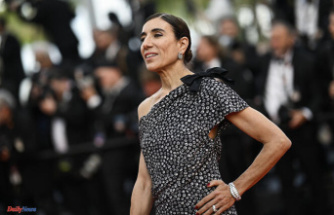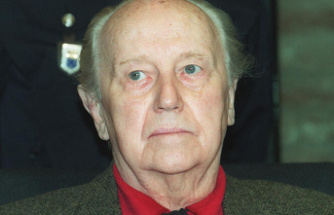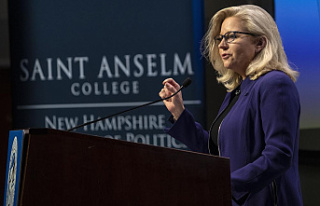GLASGOW (Scotland) -- China and the United States are the world's largest carbon polluters. They agreed Wednesday to intensify their cooperation and accelerate their efforts to reduce climate-damaging emissions. This signaled a mutual effort to combat global warming in a time when tensions were high over other issues.
Back-to-back news conferences were held at U.N. Climate talks in Glasgow. Xie Zhenhua, the Chinese climate envoy, and John Kerry, the U.S. counterpart, stated that the two countries would cooperate to accelerate emissions reductions necessary to achieve the goals of 2015 Paris Agreement on Climate Change.
Xie said that it was beneficial for both our countries and the entire world that the two largest powers in the world, China, and the U.S., share special international responsibilities. We need to think big, and be responsible.
Kerry stated that the steps being taken... could answer questions about China's pace and allow China and us to work together to speed up our efforts.
China also agreed to crackdown on methane leaks for the first-ever time, following the Biden administration's efforts in curbing the greenhouse gas. Washington and Beijing agreed to share technology in order to reduce emissions.
Paris Agreement: Governments committed to reducing greenhouse gas emissions by reducing global temperatures "well below" 2° Celsius (3.6° Fahrenheit) since preindustrial times. However, a stricter target to limit warming to 1.5° Celsius (2.7° Fahrenheit), was preferred.
Both sides acknowledge that there is a gap in efforts to reduce global climate pollution and achieve the Paris agreement goals, Xie stated.
He said, "So we will together strengthen climate action and cooperate with respect to our respective nation situations."
The U.S. and China signed a bilateral agreement in 2014. This helped to create the historic Paris accord. However, the Trump administration pulled the U.S. from the pact. Although the Biden administration was able to bring the U.S. back into that agreement, it has been at odds with China on other issues, such as cybersecurity and human rights, as well as Chinese territorial claims.
Thom Woodroofe, an expert on U.S-China climate talks, said that while this agreement isn't a major breakthrough in the same way as the 2014 US-China deal, it's a significant step forward in many ways. It means that the US-China climate dialogue can now be translated into cooperation.
This gesture of goodwill came just days after President Joe Biden criticized Russian President Vladimir Putin's inability to attend talks in person and Chinese President Xi Jinping for not making more progress in climate negotiations.
According to the declaration, the U.S. will also revive a working party that will meet regularly to address climate crisis and advance multilateral processes. It will focus on concrete actions during the next decade.
Washington and Beijing will update the world about their national targets for 2035-2025, a significant move for China. China also stated that it will make "best efforts" to accelerate its plans to decrease coal consumption during the second half this decade.
This announcement was made as governments around the globe were meeting in Glasgow to discuss how to improve on the Paris Agreement and reduce greenhouse gas emissions, while protecting vulnerable countries from the effects of global warming.
Antonio Guterres, U.N. Secretary-General, called it "an important step forward in the right direction."
Experts noted that the agreement was lacking commitments to significantly reduce heat-trapping gas emissions.
"It's encouraging that the two largest emitters in the world can work together to tackle the greatest crisis facing humanity, but there's not much meat left after the methane stuff," stated Byford Tsang, a China policy analyst at the European think tank E3G.
A draft of a larger agreement was being negotiated in Glasgow by nearly 200 countries. It called for the acceleration of the elimination of coal, the biggest source of man-made emission. However, it did not set a timeline.
It is extremely sensitive for countries like China and India that depend on fossil fuels for their economic growth and major exporters of coal, such as Australia, to set deadlines for the phasing them out. In the United States, the future of coal has been a major topic. A dispute among Democrats has stalled President Joe Biden’s landmark climate bill.
Jennifer Morgan, Greenpeace International's director, stated that while the call to eliminate coal in the draft would be the first in a U.N.-based climate agreement, the absence of a timetable would make it less effective.
"This is not the plan to solve climate emergencies. Morgan stated that this won't give street children the confidence they need.
Draft also expresses concern and alarm about the extent to which Earth has warmed up and calls for countries to reduce carbon dioxide emissions by half by 2030. The pledges made by governments so far don't amount to this frequently stated goal.
Although the draft may change, it does not include all the agreements on the three main goals that the U.N. established going into negotiations. The U.N. wanted rich countries to provide $100 billion per year in climate aid to poorer nations, so that half of the money can be used to adapt to global warming and the other half to reduce global carbon emissions by 2030.
It regrets that wealthy nations have not lived up to their climate finance commitments. They currently provide $80 billion per year. This is not enough for poorer countries that are in dire need of financial assistance to adapt to climate change and develop green energy systems.
Wera Mori, the Papua New Guinea Environment minister, said that due to the lack of financial assistance his country might "rethink" its efforts to reduce logging and coal mining or even come to U.N. negotiations.
According to the draft, the world should aim to reach "net zero (emissions) by mid-century," which was supported by leaders of the Group of 20 largest economies at a summit that took place just before the Glasgow talks. This means that countries must only emit as much greenhouse gas as can absorb through natural and artificial means.
The draft vaguely "exhorts" developed countries to compensate developing nations for "loss or damage," which is a reference to one of the major issues facing poorer countries. This phrase is not liked by some rich countries. However, there are no financial commitments.
Alok Sharma of Britain, who is currently chairing the negotiations acknowledged that there are "significant issues still unresolved."
He told negotiators that he had a big request for all of them: "Please come armed with currency of compromise." "What we agree to in Glasgow will determine the future of our children and grandchildren. I am certain that we will not fail them."












